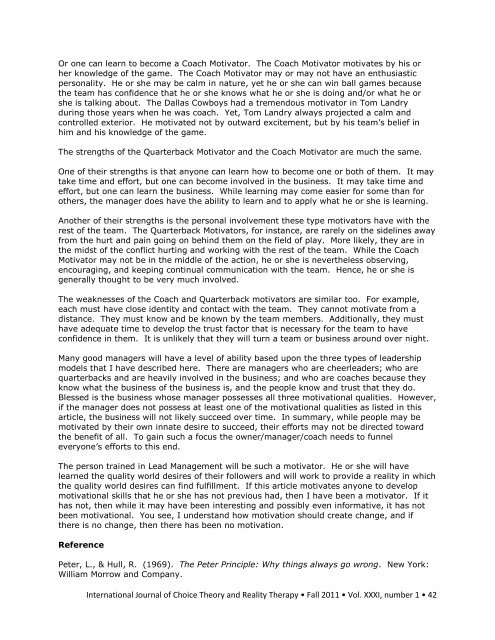International Journal of Choice Theory® and Reality ... - CTRTJournal
International Journal of Choice Theory® and Reality ... - CTRTJournal
International Journal of Choice Theory® and Reality ... - CTRTJournal
You also want an ePaper? Increase the reach of your titles
YUMPU automatically turns print PDFs into web optimized ePapers that Google loves.
Or one can learn to become a Coach Motivator. The Coach Motivator motivates by his or<br />
her knowledge <strong>of</strong> the game. The Coach Motivator may or may not have an enthusiastic<br />
personality. He or she may be calm in nature, yet he or she can win ball games because<br />
the team has confidence that he or she knows what he or she is doing <strong>and</strong>/or what he or<br />
she is talking about. The Dallas Cowboys had a tremendous motivator in Tom L<strong>and</strong>ry<br />
during those years when he was coach. Yet, Tom L<strong>and</strong>ry always projected a calm <strong>and</strong><br />
controlled exterior. He motivated not by outward excitement, but by his team‘s belief in<br />
him <strong>and</strong> his knowledge <strong>of</strong> the game.<br />
The strengths <strong>of</strong> the Quarterback Motivator <strong>and</strong> the Coach Motivator are much the same.<br />
One <strong>of</strong> their strengths is that anyone can learn how to become one or both <strong>of</strong> them. It may<br />
take time <strong>and</strong> effort, but one can become involved in the business. It may take time <strong>and</strong><br />
effort, but one can learn the business. While learning may come easier for some than for<br />
others, the manager does have the ability to learn <strong>and</strong> to apply what he or she is learning.<br />
Another <strong>of</strong> their strengths is the personal involvement these type motivators have with the<br />
rest <strong>of</strong> the team. The Quarterback Motivators, for instance, are rarely on the sidelines away<br />
from the hurt <strong>and</strong> pain going on behind them on the field <strong>of</strong> play. More likely, they are in<br />
the midst <strong>of</strong> the conflict hurting <strong>and</strong> working with the rest <strong>of</strong> the team. While the Coach<br />
Motivator may not be in the middle <strong>of</strong> the action, he or she is nevertheless observing,<br />
encouraging, <strong>and</strong> keeping continual communication with the team. Hence, he or she is<br />
generally thought to be very much involved.<br />
The weaknesses <strong>of</strong> the Coach <strong>and</strong> Quarterback motivators are similar too. For example,<br />
each must have close identity <strong>and</strong> contact with the team. They cannot motivate from a<br />
distance. They must know <strong>and</strong> be known by the team members. Additionally, they must<br />
have adequate time to develop the trust factor that is necessary for the team to have<br />
confidence in them. It is unlikely that they will turn a team or business around over night.<br />
Many good managers will have a level <strong>of</strong> ability based upon the three types <strong>of</strong> leadership<br />
models that I have described here. There are managers who are cheerleaders; who are<br />
quarterbacks <strong>and</strong> are heavily involved in the business; <strong>and</strong> who are coaches because they<br />
know what the business <strong>of</strong> the business is, <strong>and</strong> the people know <strong>and</strong> trust that they do.<br />
Blessed is the business whose manager possesses all three motivational qualities. However,<br />
if the manager does not possess at least one <strong>of</strong> the motivational qualities as listed in this<br />
article, the business will not likely succeed over time. In summary, while people may be<br />
motivated by their own innate desire to succeed, their efforts may not be directed toward<br />
the benefit <strong>of</strong> all. To gain such a focus the owner/manager/coach needs to funnel<br />
everyone‘s efforts to this end.<br />
The person trained in Lead Management will be such a motivator. He or she will have<br />
learned the quality world desires <strong>of</strong> their followers <strong>and</strong> will work to provide a reality in which<br />
the quality world desires can find fulfillment. If this article motivates anyone to develop<br />
motivational skills that he or she has not previous had, then I have been a motivator. If it<br />
has not, then while it may have been interesting <strong>and</strong> possibly even informative, it has not<br />
been motivational. You see, I underst<strong>and</strong> how motivation should create change, <strong>and</strong> if<br />
there is no change, then there has been no motivation.<br />
Reference<br />
Peter, L., & Hull, R. (1969). The Peter Principle: Why things always go wrong. New York:<br />
William Morrow <strong>and</strong> Company.<br />
<strong>International</strong> <strong>Journal</strong> <strong>of</strong> <strong>Choice</strong> Theory <strong>and</strong> <strong>Reality</strong> Therapy • Fall 2011 • Vol. XXXI, number 1 • 42




